Library
Green Infrastructure Champions: Project Archive
This project has ended. Archived project materials are available below.
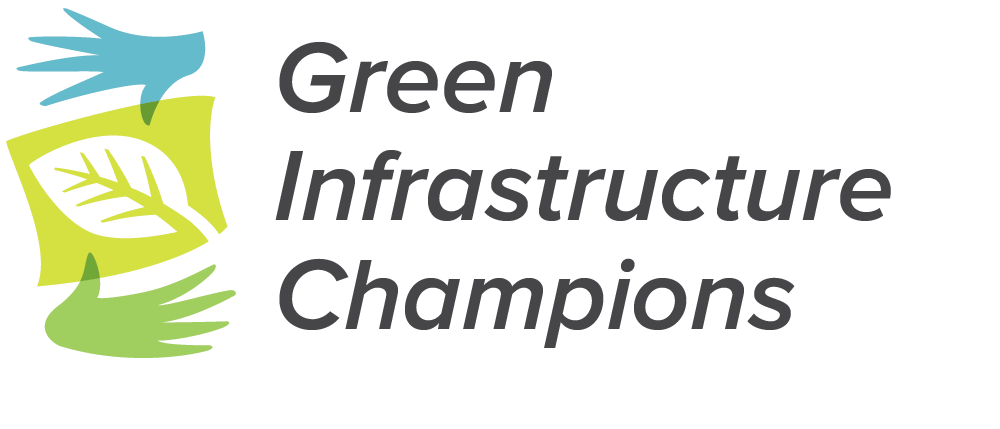 Physical barriers prevent water from cycling naturally, resulting in flooding, sewer overflows, and risks to human health and property. City institutions that manage drinking, storm, and waste water are often separate systems or in separate departments. Mid-sized municipalities often lack the resources needed to adequately address these issues. The Great Lakes Green Infrastructure Champions Program helps communities overcome the physical and institutional barriers to more effective stormwater management by providing communities with tools they typically lack: funding and expertise. By addressing these barriers, the Green Infrastructure Champions Program will facilitate broader adoption of green infrastructure throughout the Great Lakes basin.
Physical barriers prevent water from cycling naturally, resulting in flooding, sewer overflows, and risks to human health and property. City institutions that manage drinking, storm, and waste water are often separate systems or in separate departments. Mid-sized municipalities often lack the resources needed to adequately address these issues. The Great Lakes Green Infrastructure Champions Program helps communities overcome the physical and institutional barriers to more effective stormwater management by providing communities with tools they typically lack: funding and expertise. By addressing these barriers, the Green Infrastructure Champions Program will facilitate broader adoption of green infrastructure throughout the Great Lakes basin.
The program was piloted from 2016 to 2018 and continued through September 2020. Funding for this project was provided by the Fred A. and Barbara M. Erb Family Foundation.
Learn More about Green Infrastructure Champions
The Great Lakes Commission Green Infrastructure Champions Program fosters the adoption of green infrastructure in communities across the binational Great Lakes region by creating a peer-to-peer mentorship network that accelerates knowledge transfer between pioneering and emerging green infrastructure champions. A small grants program complements the network to build green infrastructure capacity in emerging communities.
Green infrastructure is a cost-effective approach to water management that restores or mimics the natural water cycle. With funding from the Erb Family Foundation and support from an Advisory Team, the Great Lakes Commission (GLC) helps catalyze the adoption of green infrastructure practices and policies across the binational Great Lakes Basin.
The GLC’s Great Lakes Green Infrastructure Champions Program convenes green infrastructure leaders and helps them share their knowledge in order to foster the adoption of green infrastructure in communities across the binational Great Lakes region. The program coordinates a peer-to-peer mentoring network of “green infrastructure champions” and “emerging champions” that lack resources or expertise to integrate nature‐based solutions into their stormwater management. Mentors and mentees are paired based on needs and expertise that are tailored to unique community goals. The program also awards mini‐grants to a subset of participants in the mentoring network, enabling those communities to develop specific tools or projects that can scale up green infrastructure. Mentors and mentees share lessons learned through periodic webinars among all participants in the mentoring network. Finally, the program offers workshops to showcase successful green infrastructure projects and approaches and to share experiences about the tools and approaches that enable successful green infrastructure implementation.
The program was piloted from 2016 to 2018 and continued through September 2020.
Project Documents
Peer-to-Peer Mentoring Network
The Green Infrastructure Champions peer-to-peer mentoring network connects experienced green infrastructure practitioners with individuals that would like to bring green infrastructure to their communities. The mentoring network fosters the transfer of knowledge from experienced green infrastructure practitioners to a broader network of communities across the binational Great Lakes basin by pairing emerging champions (mentees) with pioneer champions (mentors). Emerging champions are eager to remove barriers and build capacity expanding green infrastructure implementation in their community/sphere of influence. Some emerging champions that received mini-grants for their green infrastructure work are shown on this map. Pioneer champions have successfully implemented green infrastructure in their community and are ready to share their skills and knowledge.
Quarterly Update #1: Mentoring Network Kick-off Webinar (10/24/19)
Emerging Champion – Mentee
The deadline to join the mentoring network as a mentee has passed. To sign up as a mentee, you must complete the Mentee Needs Form. The completed form may be submitted online or downloaded as a PDF and emailed to [email protected]. The Great Lakes Commission will match you with a mentor based on the reported needs. The mentoring agreement will be signed once you are paired with a mentor.
Emerging (Mentee) Champion Needs Form – PDF Download
Pioneer Champion – Mentor
To sign up as a mentor, you must complete the Mentor Skills Form. The completed form may be submitted online or downloaded as a PDF and emailed to [email protected]. The Mentoring Agreement will be completed when you are paired with a mentee. Based on the needs of the mentees, we will be accepting new mentors throughout the program.
Pioneer (Mentor) Champion Skills Form – Submit Online
Pioneer (Mentor) Champion Skills Form – PDF Download
Read the factsheet and FAQs for more information on the mentoring network.
Mini-Grant Program
Great Lakes Emerging Champions Mini-Grants are intended to increase green infrastructure (GI) implementation capacity in small to mid-sized communities in the Great Lakes Basin by supporting selected communities with grants up to $15,000 USD. Grants support community projects that focus on developing strategies to overcome key institutional barriers to implementing GI in communities. Mini-grant recipients become participants in the Great Lakes Green Infrastructure Champions Mentoring Network and are paired with a mentor identified by the Great Lakes Commission and their advisers.
Communities within the Great Lakes Basin, inclusive of both the U.S. and Canada, with a population less than 250,000 are eligible to apply for mini-grants. Successful proposals will clearly demonstrate how the project will overcome actual barriers and facilitate GI implementation in the community. Projects must focus on one or more of four key strategies for removing barriers to GI implementation:
- Local code/ordinance review and revision
- GI Operations and maintenance training, procedures, and workforce development
- Sustainable funding streams
- Other projects that address barriers to GI Implementation
Mini-grant proposals should be submitted electronically as a single PDF document to Victoria Pebbles at [email protected]. For further details and submission guidelines, please see the request for proposals. The deadline for proposals is Wednesday, July 31, 2019.
Important Documents
Request for Proposals
Budget Form (Excel workbook)
Webinar
An informational webinar was held on Thursday, April 18 for interested applicants. The webinar featured an overview of the mini-grant program and proposal requirements and provided an opportunity for participants to ask questions about how to craft a successful proposal. Resources from the webinar are below.
Presentation slides
Webinar recording
Q/A Summary
Workshop - May 30, 2019 - Chili, NY
Chili, NY Workshop Recap
On Thursday, May 30 2019, the Great Lakes Green Infrastructure Champions program hosted a knowledge transfer workshop in Chili, New York that brought together municipal officials, planners, and consultants together to learn about green infrastructure opportunities in the Great Lakes, and lessons learned from each other. The workshop featured talks from representatives from the New York Department of Environmental Conservation, Monroe County (NY) Department of Environmental Services, Credit Valley Conservation, Genesee County, New York Sea Grant, Great Lakes Commission, and the Genesee/Finger Lakes Regional Planning Council.
Workshop Objectives
- Learn more about green infrastructure (GI) strategies for both rural and urban communities that support healthy, resilient watersheds
- Learn more about the GI Champions mentoring network and mini-grant program
- Provide an avenue for new and emerging green infrastructure champions to learn from local experts as they share their lessons learned about planning, design, construction, monitoring, and maintenance.
Presentations
- Basics of Stormwater & Green Infrastructure — Andy Sansone (Monroe County Department of Environmental Services)
- Green Infrastructure for Healthy, Resilient Watersheds in Black & Oatka Creek Communities — Shannon Dougherty (New York Department of Environmental Conservation)
- An Assessment Method for Determining Water Quality and Restoration Potential in an Urban Stream — Andy Sansone (Monroe County Department of Environmental Services)
- Green Genesee/Smart Genesee Natural Asset Mapping — Felipe Oltramari, (Genesee County Dept. of Planning)
- Natural Assets Valuation Study– Sakshi Saini (Credit Valley Conservation, Mississauga, Ontario)
- Great Lakes Green Infrastructure Champions Program – Margo Davis (Great Lakes Commission)
Funding
- NY Great Lakes Small Basin Grant Program
- Great Lakes Green Infrastructure Champions Program Mini-Grant
Resources
- Great Lakes Green Infrastructure Champions Mentoring Network Information
- Green Infrastructure Planning Design Guidelines
- Green Infrastructure Rapid Assessment Plans
- City of Rochester & Monroe County Green Infrastructure Retrofit Manual
- City of Rochester & Monroe County Green Infrastructure Retrofit Manual Appendices
- New York Great Lakes: Water Quality and Quantity Portal (includes GI links)
- Green Genesee/Smart Genesee
- Municipal Natural Assets Initiative: Region of Peel Pilot
Photos
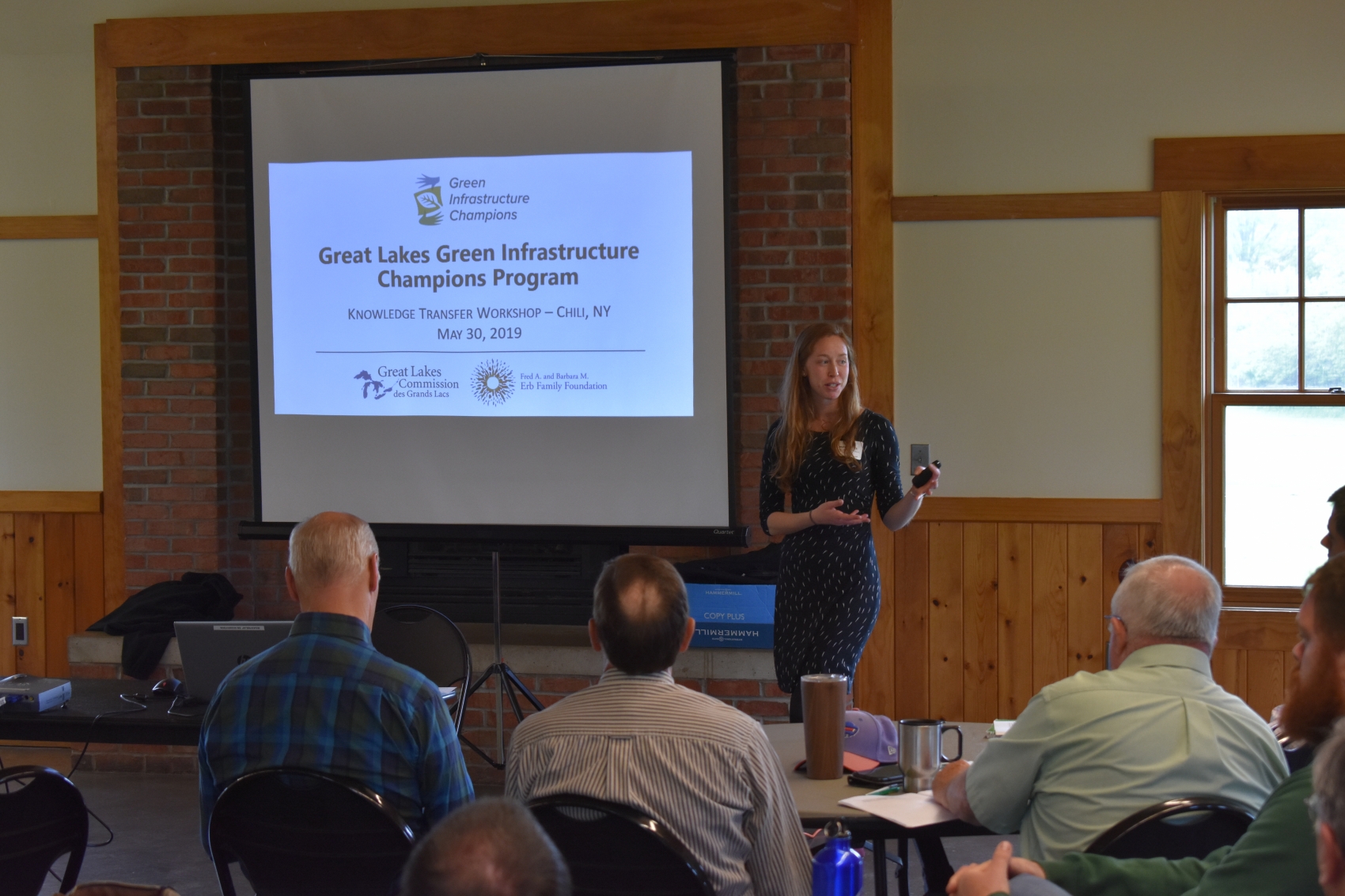
Margo Davis from the Great Lakes Commission discussing the GI Champions program. Photo: Ned Willig, GLC
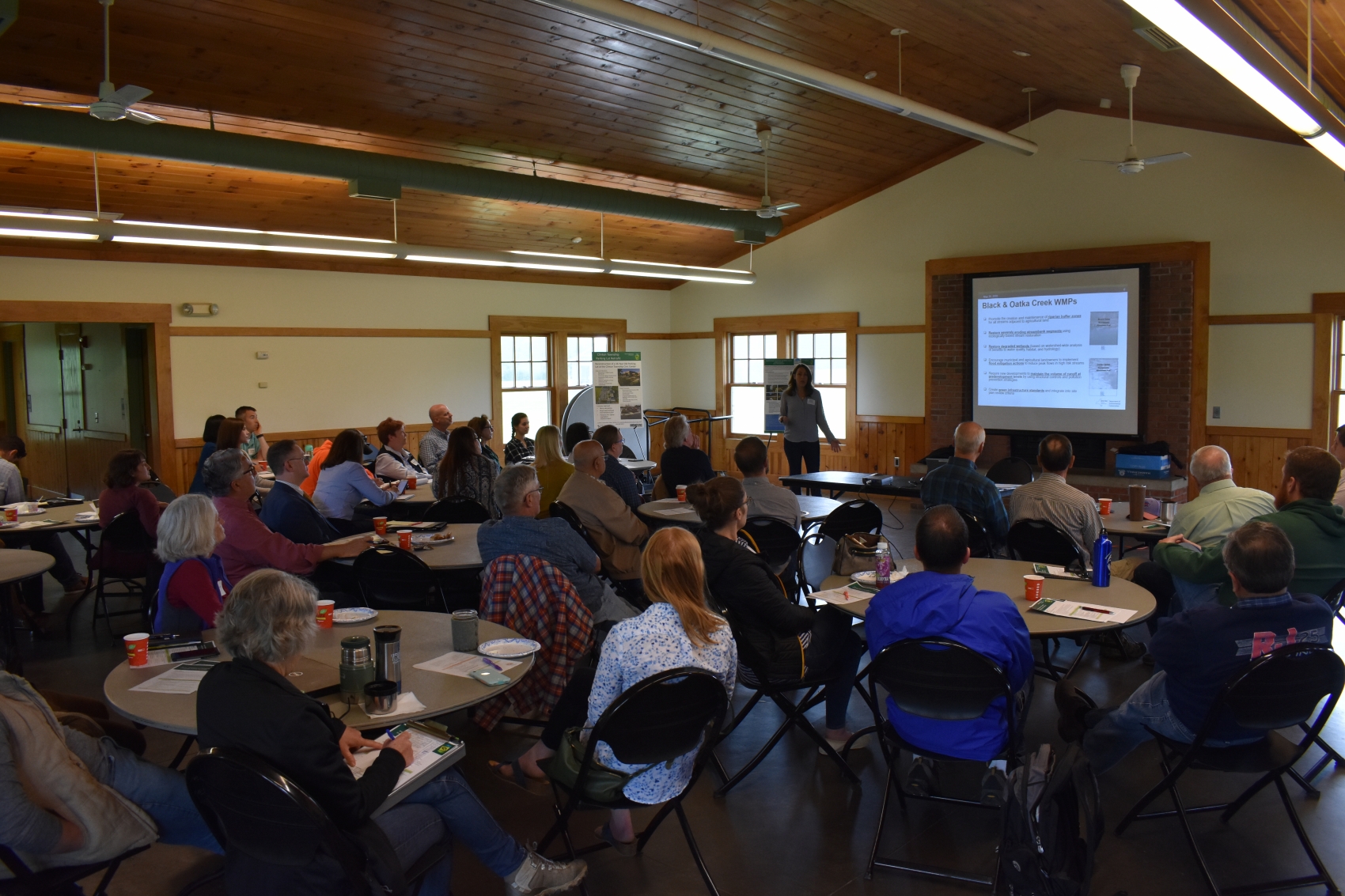
Shannon Dougherty from the New York Department of Environmental Conservation sharing information on the Black and Oatka Creek Watershed Planning and New York’s green infrastructure resources. Photo: Ned Willig, GLC
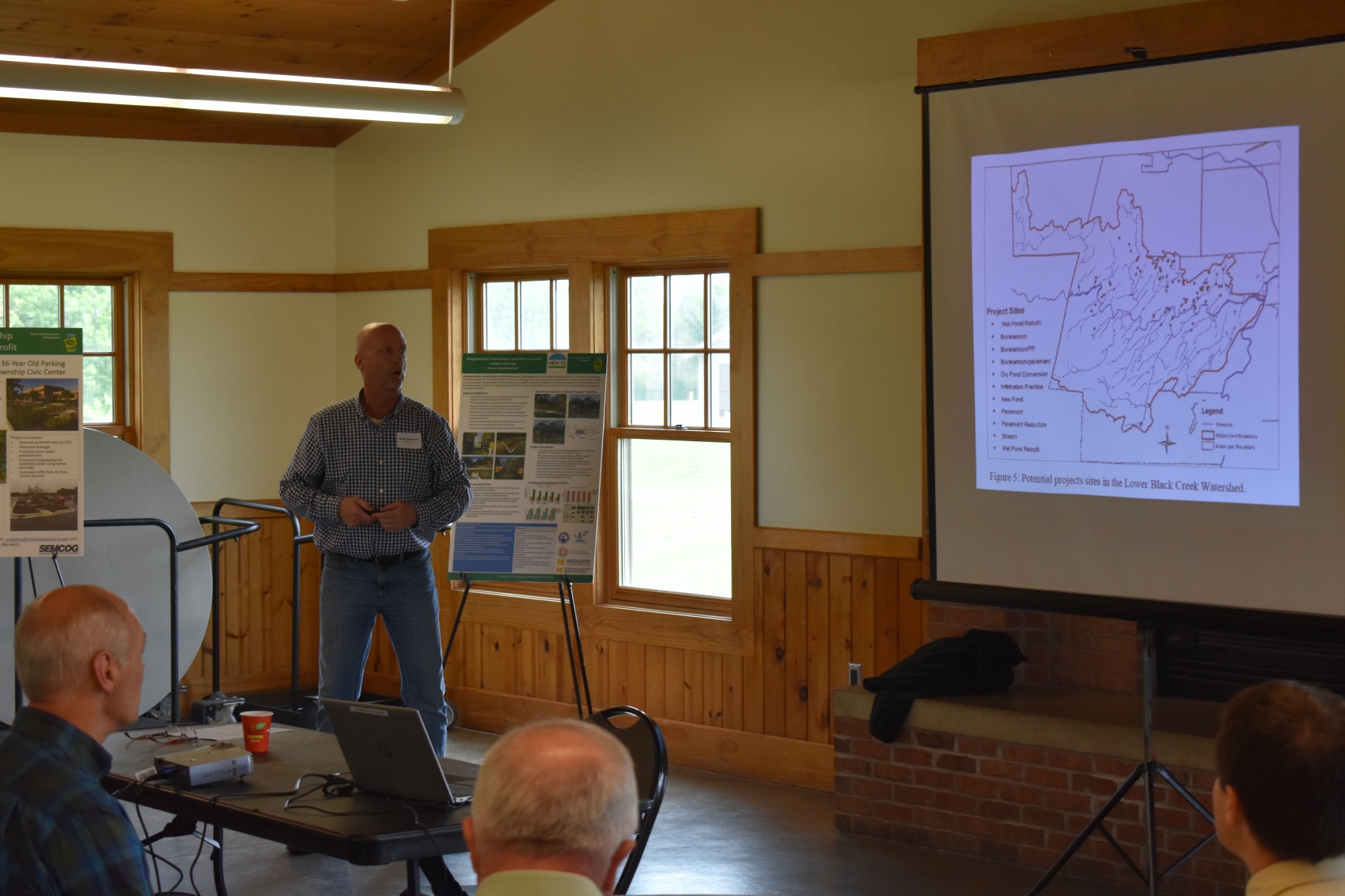
Andy Sansone from Monroe County (NY) Department of Environmental Services discussing Monroe County’s riparian restoration and retrofit efforts. Photo: Ned Willig, GLC
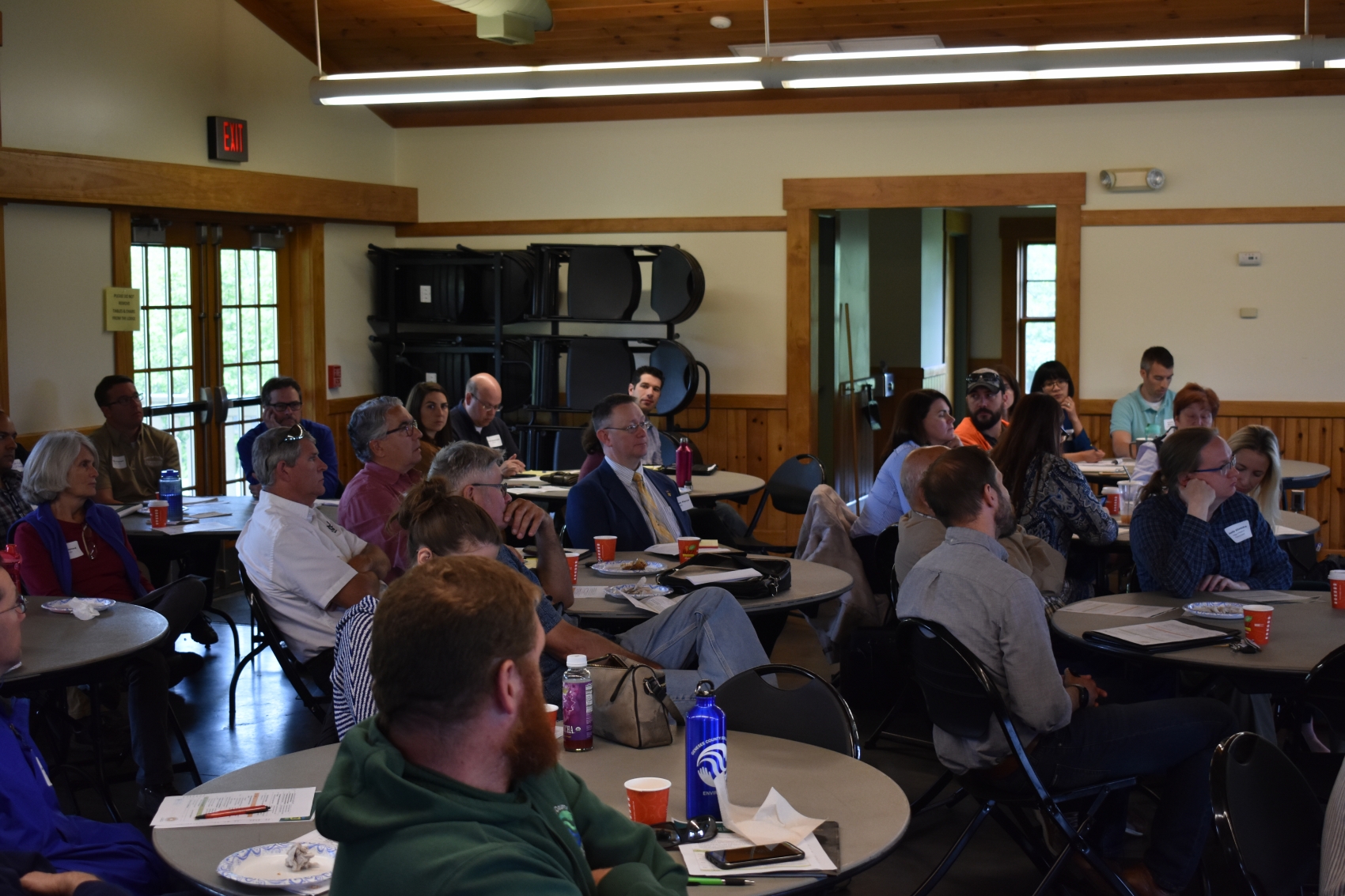
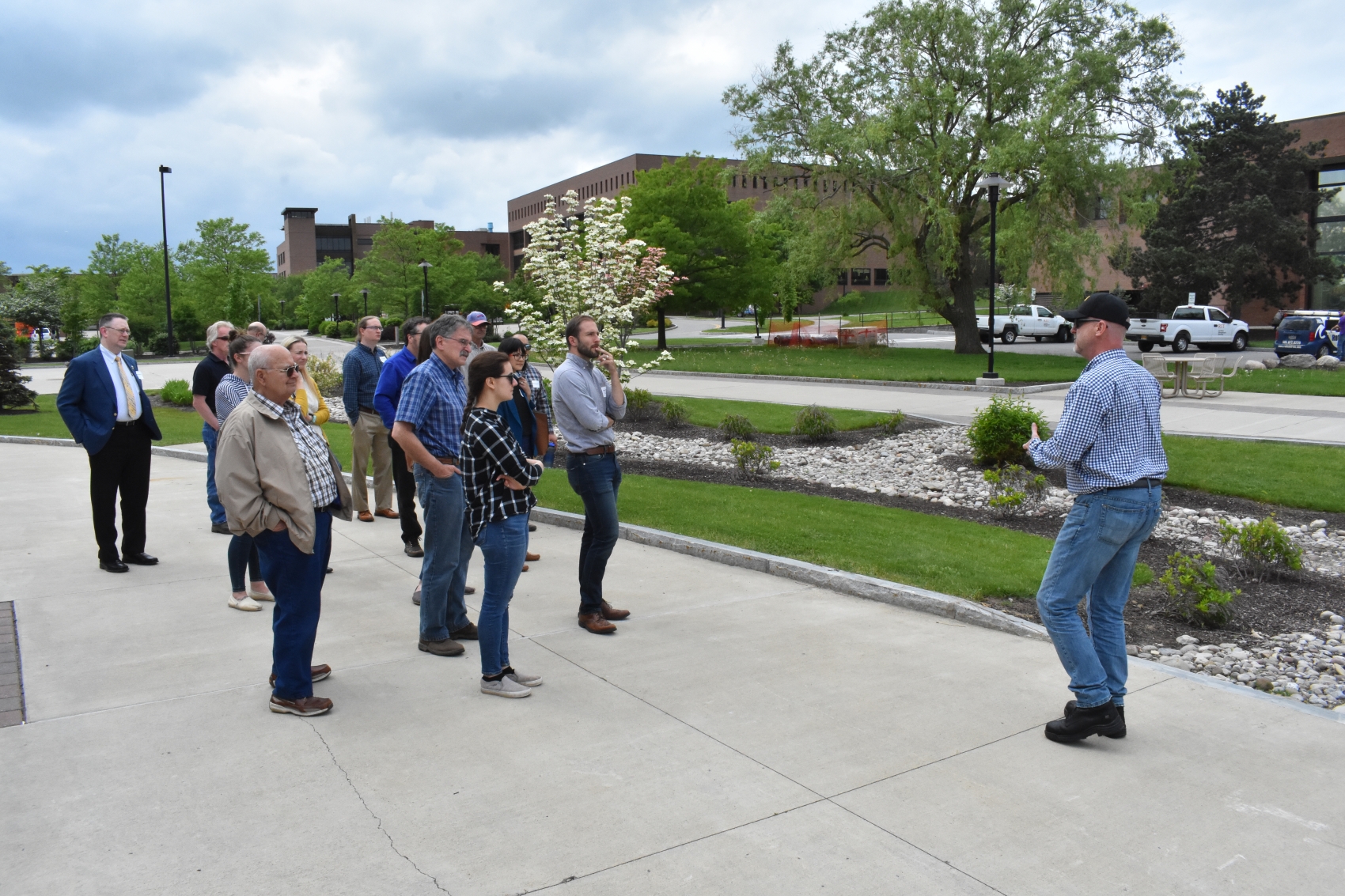
Andy Sansone leading workshop attendees through a tour of green infrastructure installations at the Rochester Institute of Technology. Photo: Ned Willig, GLC
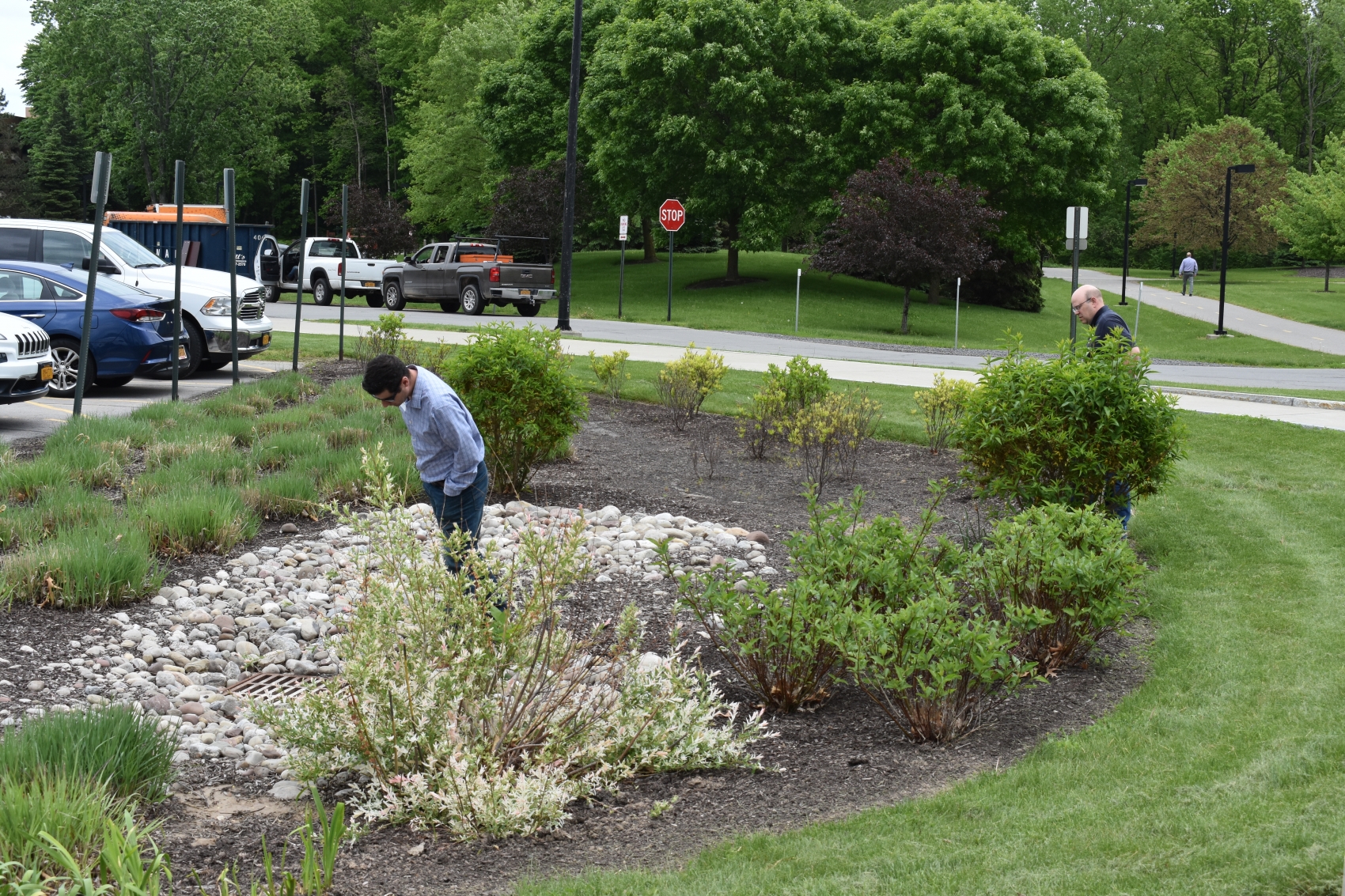
Workshop attendee inspecting a green infrastructure installation at RIT. Photo: Ned Willig, GLC
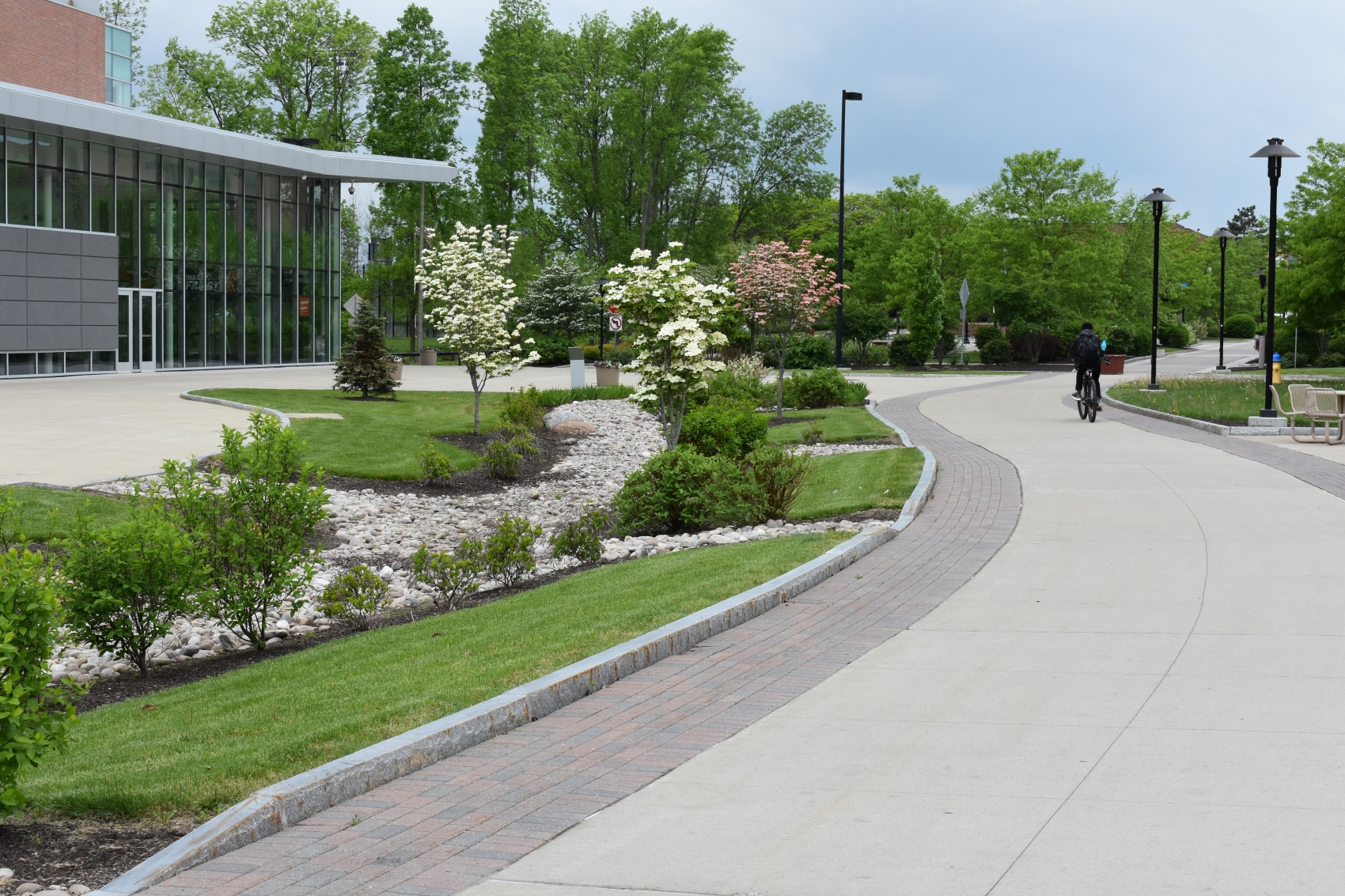
Green infrastructure installations along a walkway at RIT. Photo: Ned Willig, GLC
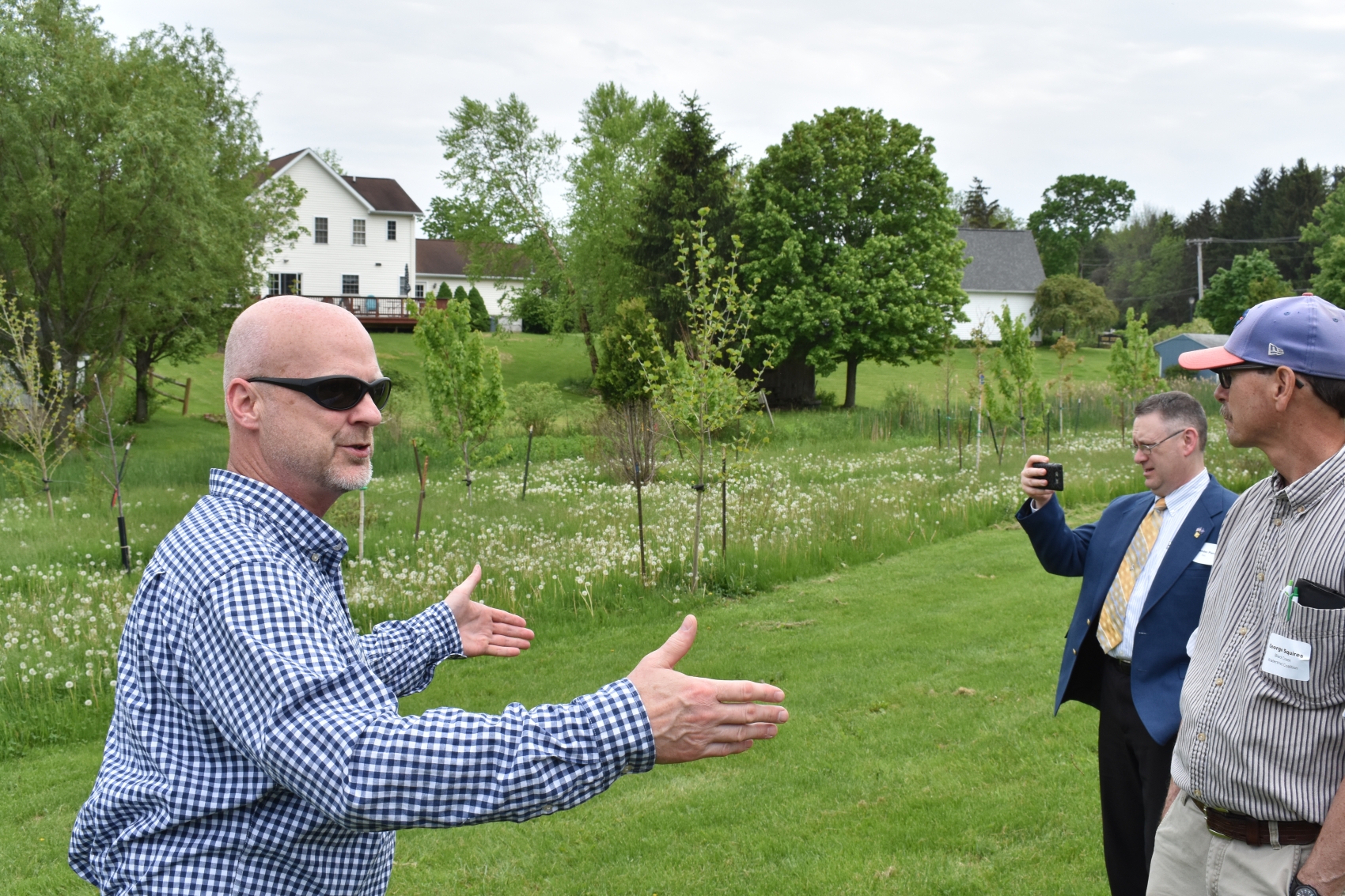
Andy Sansone sharing about the process of implementing a Riparian buffer project in Chili, NY neighborhood funded by New York Department of Environmental Conservation. Photo: Ned Willig, GLC
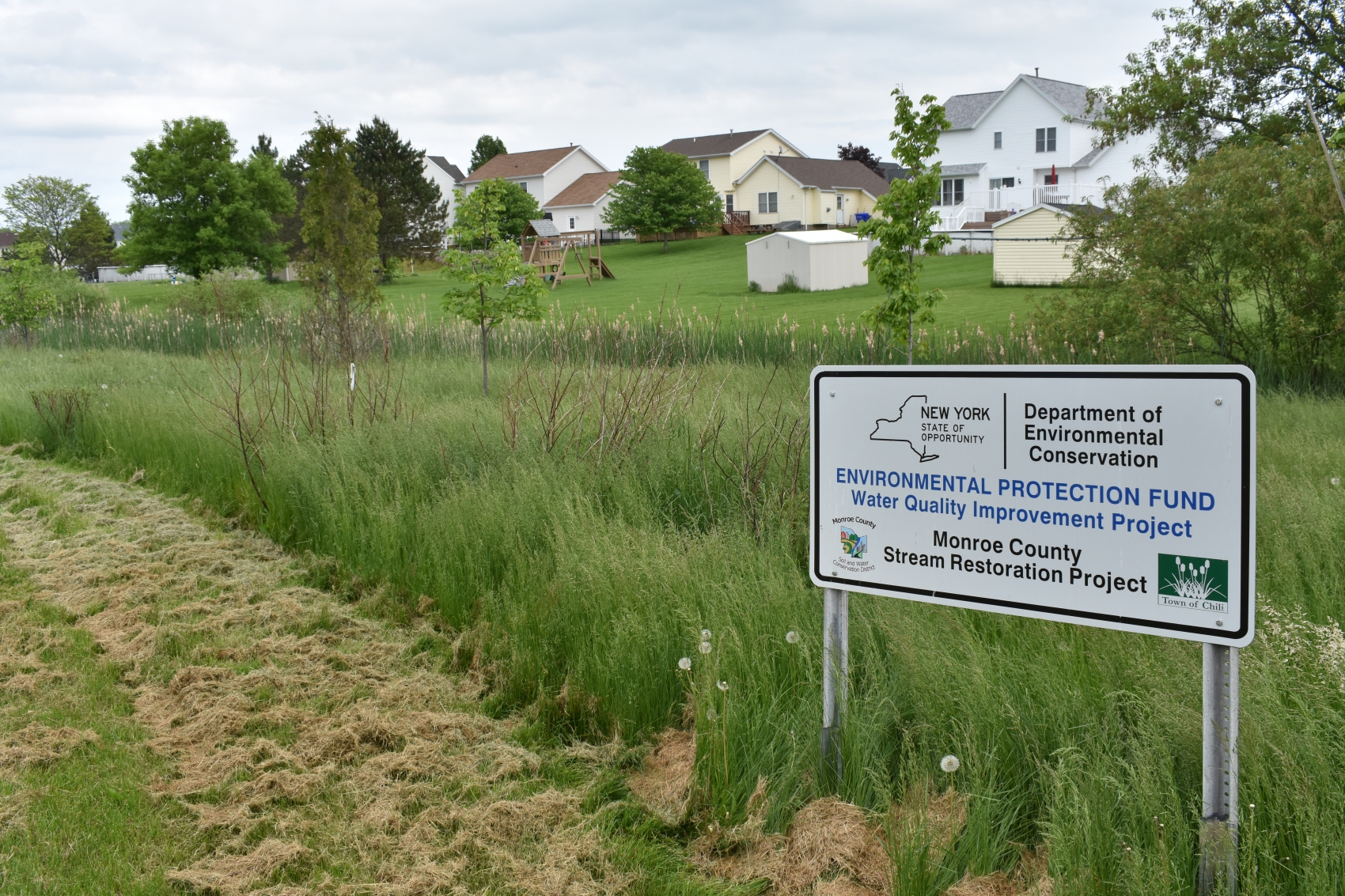
Riparian buffer project in Chili, NY neighborhood funded by New York Department of Environmental Conservation. Photo: Ned Willig, GLC
Workshop - June 20, 2019 - Gary, IN
Gary, Indiana Workshop Recap
On Thursday, June 20 2019, the Great Lakes Green Infrastructure Champions partners with the City of Gary to host a knowledge transfer workshop in Gary that brought together municipal officials, planners, and consultants together to share lessons learned and learn about green infrastructure opportunities in the Great Lakes region. The workshop featured talks from representatives from the Gary Stormwater Management Department, Gary Sanitary District, Northwest Indiana Forum, Center for Neighborhood Technology, Holden Forest and Gardens, U.S. Geological Survey, Town of Merrillville, Illinois-Indiana Sea Grant, and the Great Lakes Commission.
Workshop Objectives
- Learn how Gary and other communities engage with residents to design and build green infrastructure (GI)
- Share and discuss successes and future opportunities for green infrastructure in Gary and other Great Lakes cities
- Provide an avenue for new and emerging green infrastructure champions to learn from local experts as they share their lessons learned about planning, design, construction, monitoring, and maintenance
Presentations
- Vacant to Vibrant: Creating Successful Green Infrastructure Networks — Sandra Albro, Holden Forests & Gardens
- Lessons learned: City of Gary Stormwater Action Plan — Drew Williams, Center for Neighborhood Technology
- Merrillville Low Impact Development: Call to Action — Matt Lake, Town of Merrillville
- Great Lakes Green Infrastructure Champions Program — Margo Davis, Great Lakes Commission
Funding
Resources
Photos
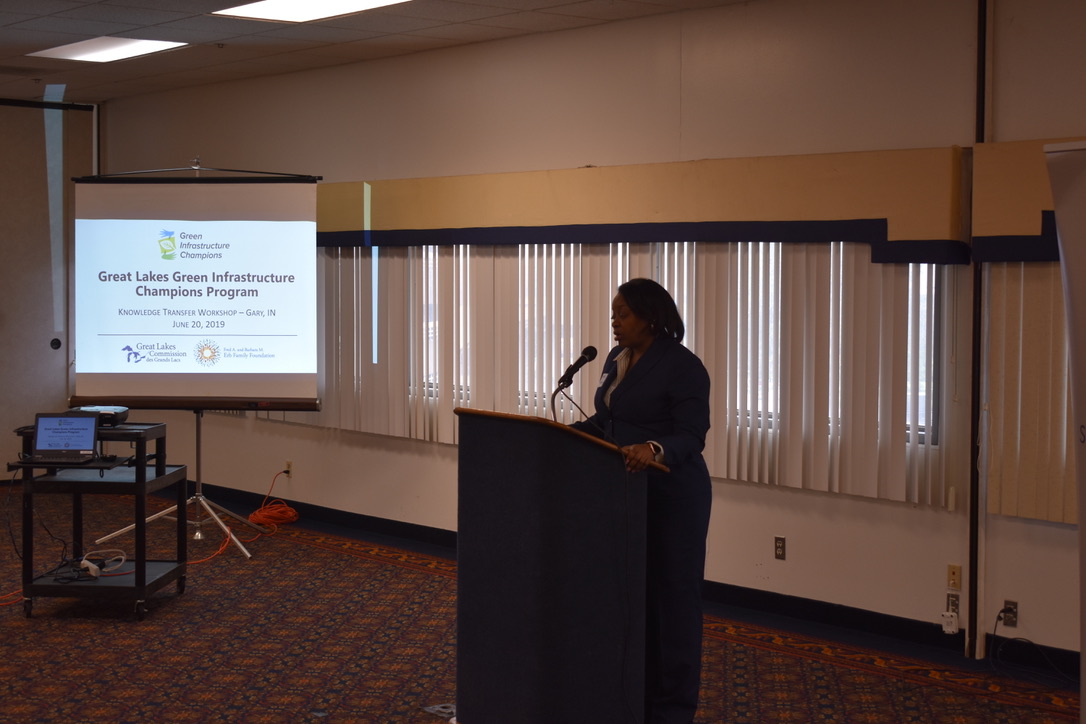
Brenda Scott-Henry from the Gary Stormwater Management District kicks off the Green Infrastructure Champions workshop. Photo: Ned Willig, GLC.

Dave Lampe from U.S. Geological Survey (USGS) presents on research documenting stormwater reductions from green infrastructure at Gary’s City Hall (see installation below). Photo: Ned Willig, GLC.
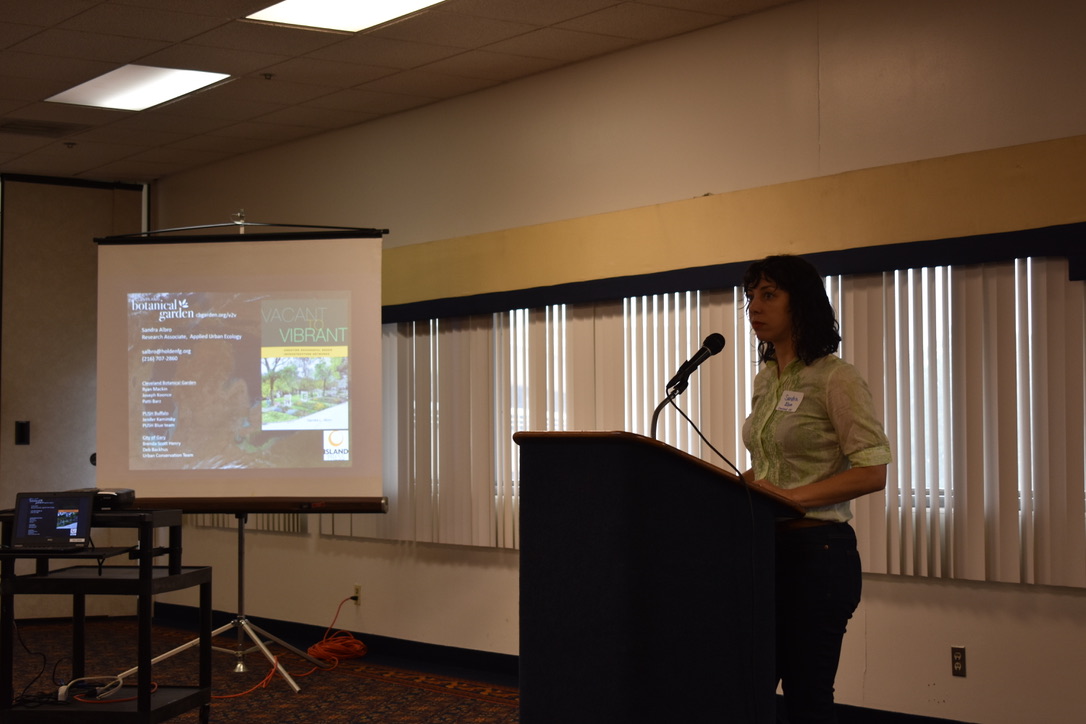
Sandra Albro from Holden Forest and Garden presents on the Vacant-to-Vibrant program. Photo: Ned Willig, GLC.
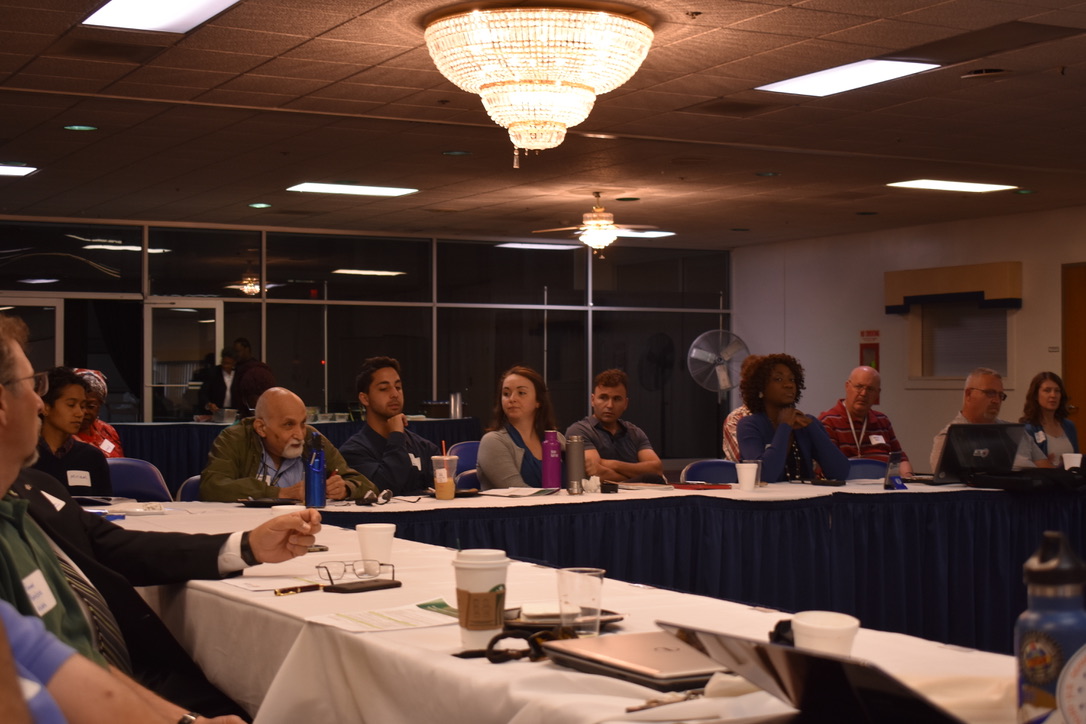
Audience members ask questions about green infrastructure efforts in Gary, Indiana. Photo: Ned Willig, GLC.

Drew Williams from the Center for Neighborhood Technology presents on the Gary/CNT Partnership for Resilient Water Infrastructure. Photo: Ned Willig, GLC.
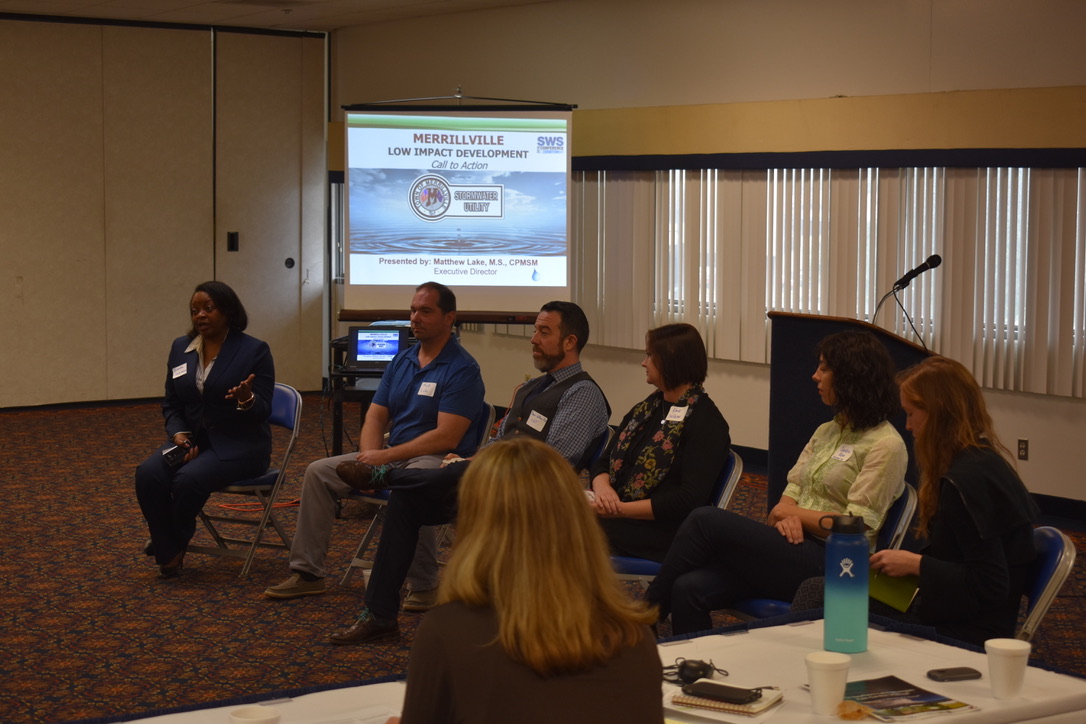
Panelists discuss opportunities and lessons learned about green infrastructure in Indiana. Photo: Ned Willig, GLC

USGS monitoring equipment outside Gary City Hall. Photo: Ned Willig, GLC.

Dave Lampe from USGS describes the green infrastructure installation and monitoring efforts at Gary City Hall. Photo: Ned Willig, GLC.
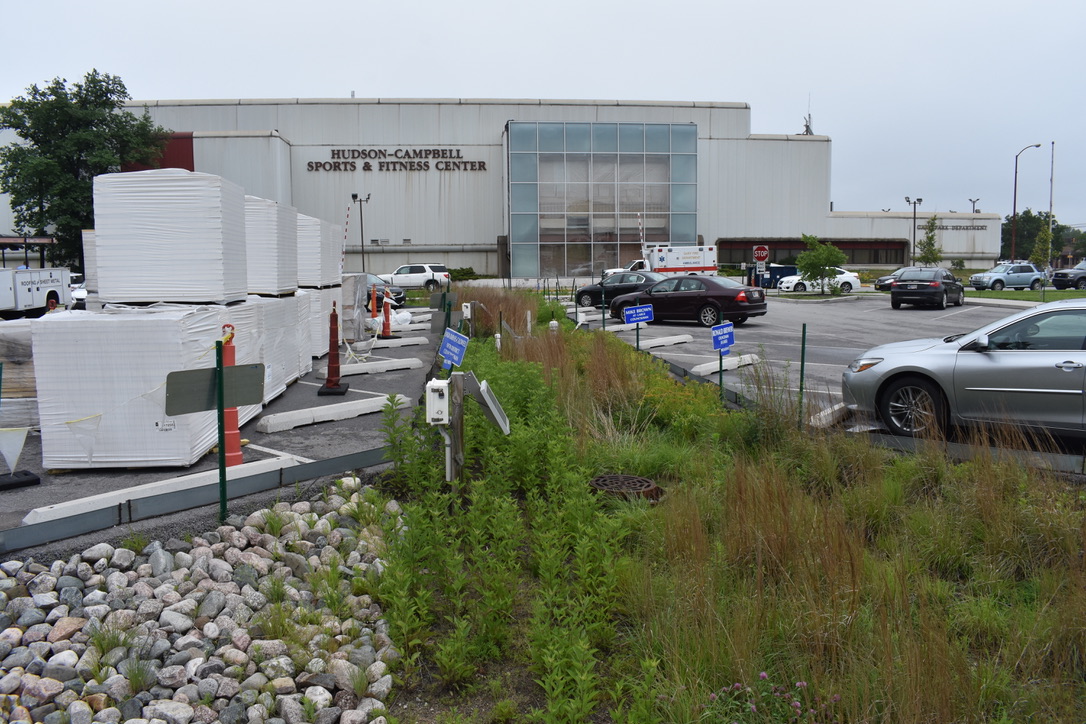
Green infrastructure installation at Gary City Hall. Photo: Ned Willig, GLC.
Workshop - June 25, 2019 - Caledon, ON
Caledon, Ontario Workshop Recap
On Tuesday, June 25 2019, the Great Lakes Green Infrastructure Champions program hosted a knowledge transfer workshop in Caledon, Ontario that brought together municipal officials, planners, and consultants together to learn about green infrastructure and natural asset management opportunities in Ontario, and lessons learned from each other. The workshop featured talks from representatives from Green Communities Canada, Credit Valley Conservation, Toronto Regional Conservation Authority, AMOntario, Region of York, City of Richmond Hills, and the Great Lakes Commission.
Workshop Objectives
- Learn from local experts experienced in Green Infrastructure (Natural Asset) Asset Management Planning, Monitoring and Valuation.
- Learn how green infrastructure (GI) and natural asset management practices support stormwater risk reduction and resiliency efforts.
- Gain insight into how planning for natural assets can be integrated with asset management planning as per O.Reg. 588/17 requirements.
- Learn about the Green Infrastructure Champions Program and opportunities to receive technical assistance through mentoring network and mini-grant program.
Presentations
- Overview of the Green Infrastructure Champions Program – Victoria Pebbles, Great Lakes Commission
- O. Reg. 588/17: Asset Management Planning for Municipal Infrastructure – Dharmen Dhaliah, Asset Management Ontario (AMONTario) & Town of Halton Hills
- Overview of Green Infrastructure and Green Infrastructure Asset Management Policy Framework in Ontario – Clara Blakelock, Green Communities Canada, and Michelle Sawka, Toronto Region Conservation Authority
- Green Infrastructure: Lessons Learned at York Region – Adam Barkovitz, Region of York
- Value of Natural Assets: Lessons Learned at City of Vaughn – Roger Young and Michael Wright, City of Vaughan
- Integrating Asset Management Principles into Green Infrastructure Management – Grace McLenaghan, City of Richmond Hill
- Business case for Town of Gibsons’ natural assets financial planning – Michelle Molnar, David Suzuki Foundation
- Natural Asset Inventory and Service Valuation – Credit Valley Conservation
- Terrestrial Systems Climate Change Vulnerability Assessment and Applications – Namrata Shrestha, Toronto Region Conservation Authority
- Green Infrastructure Champions Network Grant and Mentorship Opportunity – Victoria Pebbles, Great Lakes Commission
Funding
Resources
Photos
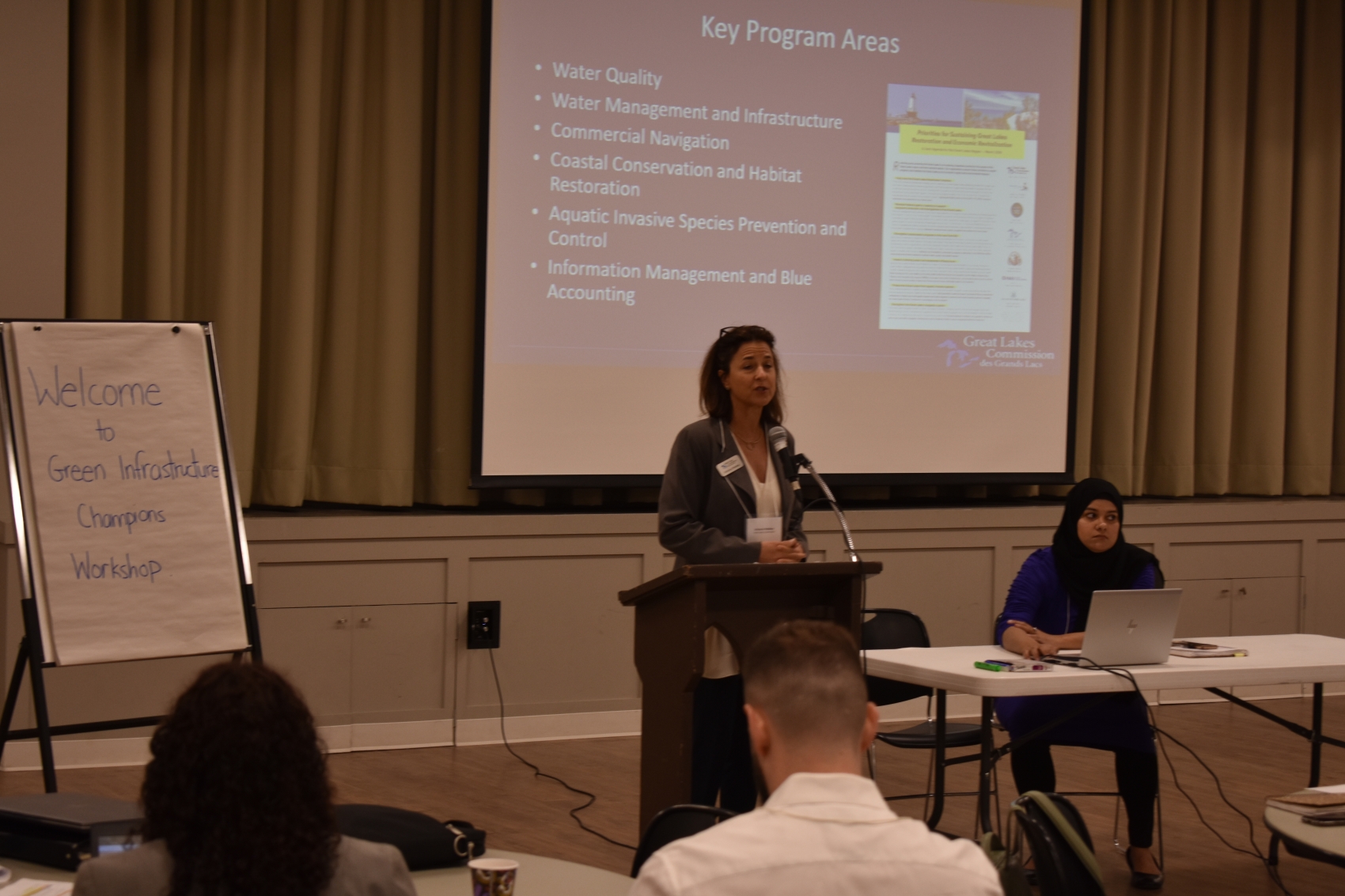
Victoria Pebbles, Great Lakes Commission Program Director, kicks-off the GI Champions workshop in Caledon, Ontario. Photo: Ned Willig, GLC.
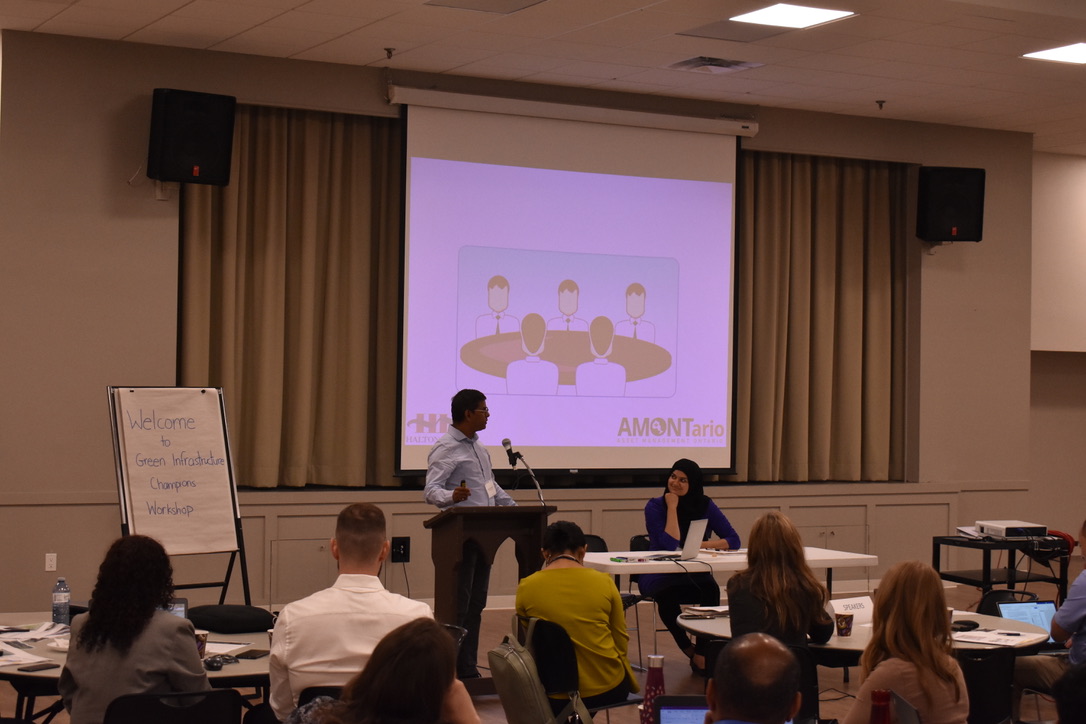
Dharmen Dhaliah from AMOntario and Town of Halton Hills discusses opportunities from natural assets to support municipal asset management goals. Photo: Ned Willig, GLC
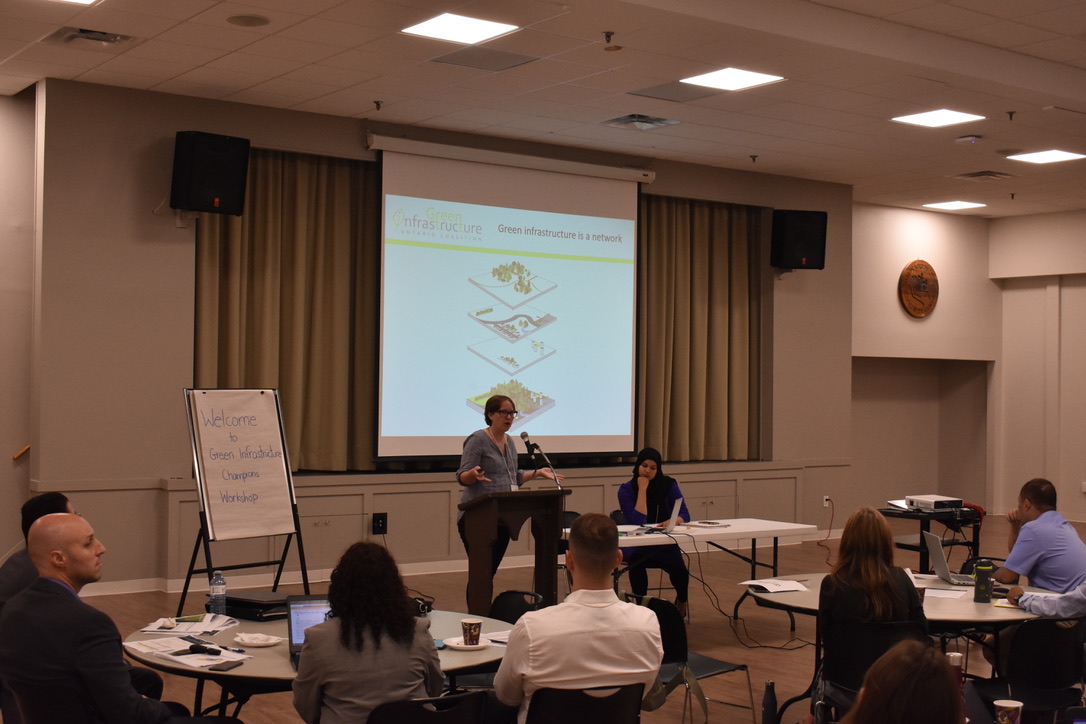
Clara Blakelock from Green Communities Canada presents on green infrastructure opportunities in Ontario. Photo: Ned Willig, GLC
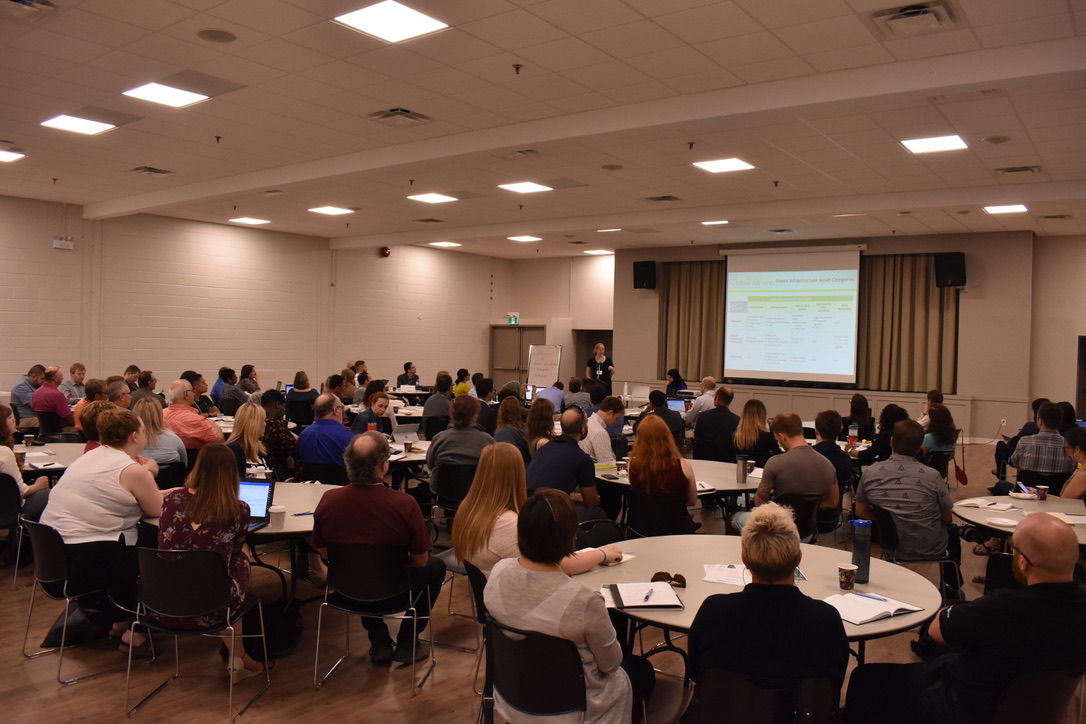
Michelle Sawka from Toronto Region Conservation Authority discusses how green infrastructure and natural assets support municipal stormwater management efforts. Photo: Ned Willig, GLC

Margo Davis from the Great Lakes Commission leads a panel on methods and gaps in valuation of natural asset services. Photo: Ned Willig, GLC
2017 Workshops
October 5, 2017 – London, Ontario
October 11, 2017 – Detroit, Michigan
For More Information
Nicole Zacharda
Program Manager, Great Lakes Commission
[email protected]
